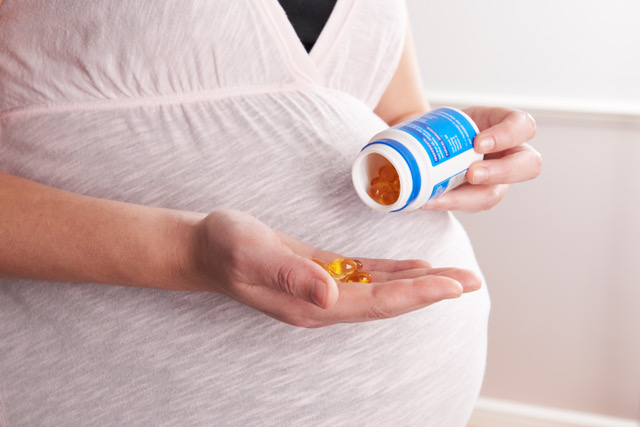Fatty fish, like anchovies or salmon, is an excellent source of essential long-chain polyunsaturated fatty acids (LCPUFA), including arachidonic acid, docosahexaenoic acid (DHA) and eicosapentaenoic acid (EPA). These fatty acids, particularly DHA, are necessary for retinal and brain development, predominantly in the third trimester of pregnancy when they are acquired via placental transfer and postnatally via breastmilk or formula.1 Indeed, mothers who eat plenty of fish during pregnancy and breastfeeding may protect their babies from future low verbal IQ scores.2 LCPUFAs may also be important in immune function.3 Thus, it is important that pregnant and breastfeeding women achieve adequate dietary intake of these fatty acids in order to support their baby’s growth and development.
It is recommended that pregnant and lactating women consume at least 200 mg DHA per day.4 One recent study suggests that the current recommendation might be too low. Stoutjesdijk et al.5 found that in order to ensure ideal concentrations of LCPUFAs available to the baby, women should consume 535 + 215mg DHA+EPA per day during the third trimester and 715+285mg DHA+EPA per day during the first month of breastfeeding. Importantly, consuming the recommended 10 oz (2-3 servings) of fish per week can easily provide these levels of LCPUFAs.6 Few Americans, however, eat this much fish. The average American consumes only 4 oz per week, less than half the recommended amount.6 Furthermore, the most commonly consumed varieties are low in LCPUFAs.7
There is a risk of mercury accumulation in body tissues, especially within the fetus, with high consumption of certain types of large predatory fish. Thus, pregnant and lactating women should avoid high mercury-containing fish, including swordfish, shark, king mackerel, marlin, orange roughy, tilefish, and bigeye tuna. Conversely, the FDA and EPA recommend that women who are pregnant or breastfeeding consume low mercury-containing fish, aiming for 8-12 oz (2-3 servings) per week.6 This recommendation was made based on numerous studies showing that the nutritional benefits of eating low mercury-containing fish outweighed the risk of mercury toxicity in the fetus.8,9
The low intake of fish by Americans and the fear of mercury toxicity could make it tempting for pregnant and breastfeeding women to consider simply taking a fish oil supplement. These supplements are derived from the fatty tissues of oily fish, so in theory, they should be a good source of DHA for a developing baby. The question is, does fish oil supplementation during pregnancy and lactation truly benefit the baby? Current evidence is inconclusive, and ultimately does not support the use of DHA (i.e. fish oil) supplements during pregnancy for neurocognition in infants.1 It is unclear why fish oil supplements do not appear to offer the same benefits as fish, but it may be an example of how nutrients in whole-food sources often work together to nourish the body better than individual nutrients. In fact, a recent study by Julvez et al.10 showed that consumption of fatty fish during pregnancy had a moderate benefit on child cognitive and neuropsychological development, only part of which was explained by DHA levels. This suggests that the benefits of fish consumption are not simply due to its fatty acid content. It is also worth noting that supplements are not regulated by the FDA in the United States and therefore the quality and strength of supplements cannot be guaranteed.
Fish oil supplementation during breastfeeding is less studied than in pregnancy. Breast milk is naturally a good source of DHA, but levels vary based on maternal diet.11 Indeed, mothers who take a fish oil supplement during lactation have higher levels of DHA in their breast milk.12 In term infants, this does not, however, seem to correlate with improvements in child visual or brain development.13 Conversely, in preterm infants maternal use of LCPUFA supplements during breastfeeding appears to significantly improve brain development, at least through early childhood.14
Some evidence indicates that maternal fish oil supplementation may have immune benefits to the infant. It has been found that high levels of DHA in breastmilk are associated with higher infant IgA, an antibody class that is important in mucosal immunity.3 Additionally, fish oil supplementation during pregnancy may also reduce the risk of food allergies and asthma in offspring.15,16 Further research is needed in order to better understand these associations.
In conclusion, while fish oil supplements are generally regarded as safe, currently there is not enough evidence to suggest that taking a fish oil supplement during pregnancy and breastfeeding is of any real benefit to a term infant’s neurocognitive development. Rather, a healthy diet, including low-mercury containing fish and high-quality prenatal vitamins, is still the best way to ensure your baby is receiving adequate nutrition both prenatally and while breastfeeding.
For more information about specific types of fish during pregnancy and breastfeeding please visit https://www.fda.gov/food/consumers/advice-about-eating-fish
Hana Setterquist, MS
Christine D. Garner, PhD, RD
References:
- Meldrum S, Simmer K. Docosahexaenoic Acid and Neurodevelopmental Outcomes of Term Infants. Annals of nutrition & metabolism. 2016;69 Suppl 1:22-28.
- Hibbeln JR, Davis JM, Steer C, et al. Maternal seafood consumption in pregnancy and neurodevelopmental outcomes in childhood (ALSPAC study): an observational cohort study. Lancet. 2007;369(9561):578-585.
- Dunstan JA, Roper J, Mitoulas L, Hartmann PE, Simmer K, Prescott SL. The effect of supplementation with fish oil during pregnancy on breast milk immunoglobulin A, soluble CD14, cytokine levels and fatty acid composition. Clinical and experimental allergy : journal of the British Society for Allergy and Clinical Immunology. 2004;34(8):1237-1242.
- Koletzko B, Cetin I, Brenna JT. Dietary fat intakes for pregnant and lactating women. The British journal of nutrition. 2007;98(5):873-877.
- Stoutjesdijk E, Schaafsma A, Dijck-Brouwer DAJ, Muskiet FAJ. Fish oil supplemental dose needed to reach 1g% DHA+EPA in mature milk. Prostaglandins, leukotrienes, and essential fatty acids. 2018;128:53-61.
- U.S. Food and Drug Administration. Advice about Eating Fish. 2019; Available at: https://www.fda.gov/food/consumers/advice-about-eating-fish. Accessed 07/10/2020, 2020.
- Zeng L, Ruan M, Liu J, et al. Trends in Processed Meat, Unprocessed Red Meat, Poultry, and Fish Consumption in the United States, 1999-2016. Journal of the Academy of Nutrition and Dietetics. 2019;119(7):1085-1098.e1012.
- Kim Y, Ha EH, Park H, et al. Prenatal mercury exposure, fish intake and neurocognitive development during first three years of life: Prospective cohort mothers and Children's environmental health (MOCEH) study. The Science of the total environment. 2018;615:1192-1198.
- Xu Y, Khoury JC, Sucharew H, Dietrich K, Yolton K. Low-level gestational exposure to mercury and maternal fish consumption: Associations with neurobehavior in early infancy. Neurotoxicology and teratology. 2016;54:61-67.
- Julvez J, Méndez M, Fernandez-Barres S, et al. Maternal Consumption of Seafood in Pregnancy and Child Neuropsychological Development: A Longitudinal Study Based on a Population With High Consumption Levels. American journal of epidemiology. 2016;183(3):169-182.
- Olafsdottir AS, Thorsdottir I, Wagner KH, Elmadfa I. Polyunsaturated fatty acids in the diet and breast milk of lactating icelandic women with traditional fish and cod liver oil consumption. Annals of nutrition & metabolism. 2006;50(3):270-276.
- Boris J, Jensen B, Salvig JD, Secher NJ, Olsen SF. A randomized controlled trial of the effect of fish oil supplementation in late pregnancy and early lactation on the n-3 fatty acid content in human breast milk. Lipids. 2004;39(12):1191-1196.
- Delgado-Noguera MF, Calvache JA, Bonfill Cosp X, Kotanidou EP, Galli-Tsinopoulou A. Supplementation with long chain polyunsaturated fatty acids (LCPUFA) to breastfeeding mothers for improving child growth and development. The Cochrane database of systematic reviews. 2015(7):Cd007901.
- Wang Q, Cui Q, Yan C. The Effect of Supplementation of Long-Chain Polyunsaturated Fatty Acids During Lactation on Neurodevelopmental Outcomes of Preterm Infant From Infancy to School Age: A Systematic Review and Meta-analysis. Pediatric neurology. 2016;59:54-61.e51.
- Garcia-Larsen V, Ierodiakonou D, Jarrold K, et al. Diet during pregnancy and infancy and risk of allergic or autoimmune disease: A systematic review and meta-analysis. PLoS medicine. 2018;15(2):e1002507.
- Yang H, Xun P, He K. Fish and fish oil intake in relation to risk of asthma: a systematic review and meta-analysis. PLoS One. 2013;8(11):e80048.







